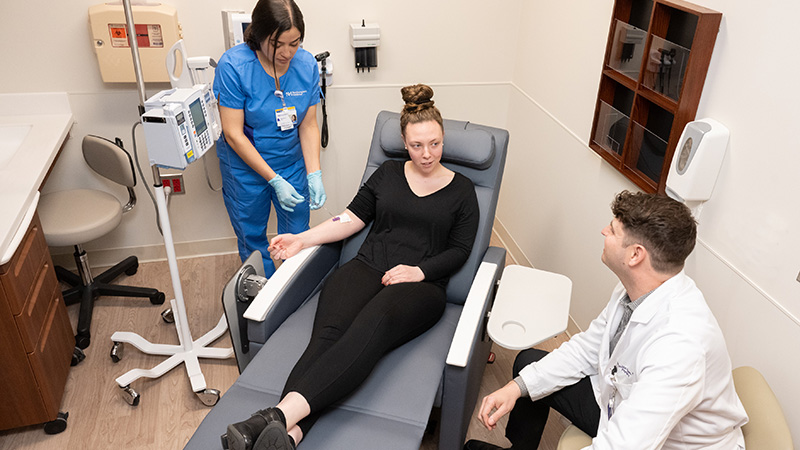Warning Signs of Teen Suicide
How to Talk to Your Teen
Updated August 2023
Suicide is a leading cause of death in the United States, and according to the Centers for Disease Control and Prevention (CDC), despite public awareness, the suicide rate continues to rise.
Research shows that youth suicide rates increased during the COVID-19 pandemic. More than 5,500 youth died by suicide during the first 10 months of the pandemic, which was higher than the expected number of youth deaths by suicide had the pandemic not occurred.
Northwestern Medicine Psychologist Nicole L. Francen Schmitt, PsyD, says the below factors have contributed to the recent increase in youth suicide rates:
- Increased access to social media and negative online media
- Feelings of isolation
- Inadequate self-care
- Stigma around mental health care
Self-injury is not necessarily always a predecessor to suicide.— Nicole L. Francen Schmitt, PsyD
Throughout adolescence, teens and young adults experience major physical, social, emotional and psychological changes. These changes, and the subsequent feelings of stress, uncertainty, fear, confusion, hopelessness and external pressure, can lead some young people to feel overmatched and to see suicide as their only option.
Risk Factors for Teen Suicide
Adolescence is a time of change, so different risk factors can arise or be more prevalent at different times for young adults. Some risk factors include:
- Existing mental health or substance use disorder — depression, anxiety and alcohol use are most common
- Impulsive behaviors and tendencies
- Romantic breakups
- Peer or social conflict
- Firearm in the household
- Family history of suicide
- Exposure to suicidal behaviors of others
- Prior suicide attempt(s)
Suicide Warning Signs
These red flags can be signs of suicidal thoughts or symptoms of depression:
- Changes in eating and sleeping behaviors
- Alcohol and drug use
- Withdrawal from friends and family members
- Neglect of personal appearance
- Lack of response to praise
- Irritability
- Sadness or crying spells
- Posts on social media suggesting feelings of isolation or depression
- Talking about or otherwise indicating plans to die by suicide or self-harm
Dr. Francen Schmitt says a common misconception is that self-injurious behavior, such as cutting, burning or picking at skin, is suicidal behavior.
"Self-injury is not necessarily always a predecessor to suicide, but it is something you should seek support from a mental health professional for your teen," says Dr. Francen Schmitt. "It's a way your teen is signifying that something is wrong and needs attention."
Ways to Support Teens
- Keep an open door. Emphasize that you are always available to talk and that they can trust you. Tell them if their peers exhibit suicidal behavior that they can come to you as a trusted adult.
- Empathize, don't criticize. Tell them that you understand and what they are going through is very difficult. Thank them for trusting you. Don't say, "You have nothing to be sad about," or, "You are overreacting." Instead ask, "What do you need?"
- Don't minimize their feelings. Avoid phrases like, "Just be positive," or, "Keep going. You've got this." Instead say, "How can I support you?"
What to Do in Crisis
Call 911 if your teen is in imminent danger due to a suicide threat or attempt.
The National Suicide Prevention Lifeline phone number is 988. This helpline offers 24/7 and confidential support at no cost.
The Trevor Project is a national organization that provides crisis intervention and suicide prevention services to LGBTQ youth. The organization and its trained professionals offer several immediate support resources, including a 24/7 crisis and suicide hotline (866.488.7386) and support via text messaging (text START to 678678).
Treatment Options
Threats of suicide reflect feelings of desperation and hopelessness. The person views problems as insurmountable, intolerable and unsolvable. Suicidal comments, then, can be cries for help. Take these statements seriously. Help is available, and evidence-based treatments work.
If you or someone you love is experiencing feelings of hopelessness or thoughts of self-harm, please call the National Suicide Prevention Lifeline at 988, or visit your nearest emergency department. Remember, you are not alone.
Northwestern Medicine extends comprehensive consultations, treatment plans and support for a full range of behavioral health issues. Specialists provide research-based treatments, care that's tailored to individual needs, one-on-one therapy and family involvement in the treatment process. Learn more about our Behavioral Health programs.






